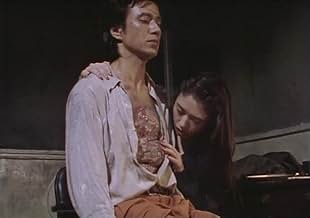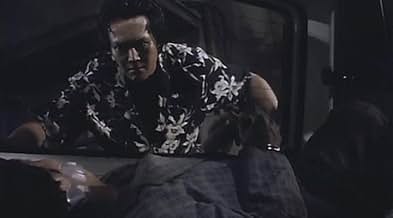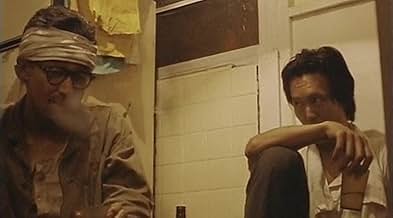Two police detectives Numata and Tosaka infiltrate a group of underground black market human organ dealers. Things go haywire during a raid on the group's surgical headquarters.Two police detectives Numata and Tosaka infiltrate a group of underground black market human organ dealers. Things go haywire during a raid on the group's surgical headquarters.Two police detectives Numata and Tosaka infiltrate a group of underground black market human organ dealers. Things go haywire during a raid on the group's surgical headquarters.
- Director
- Writer
- All cast & crew
- Production, box office & more at IMDbPro
5.3655
1
2
3
4
5
6
7
8
9
10
Featured reviews
Great effects, a broadly admirable production - but the intended plot is sadly weak and incogent
The premise catches one's eye, certainly, promising all the blood and gore a fan of horror cinema could want. But it was reading about the production that piqued my interest. It's one matter to note the experience Fujiwara Kei boasts in her career, both in her collaborations with Tsukamoto Shinya and elsewhere. It's another matter to learn of the extremely low budget; the personal involvement of the cast to also serve as crew members while effectively funding the endeavor themselves; the sets and materials that were quite literally cobbled together; and the apparent necessitated frugality of shooting only one take for any given scene so as to conserve film stock. Some terrific movies have been made with little more than earnest care and hard work, and the nitty gritty of this project is endearing, and even kind of inspiring. I admit that without particularly thinking about it I formed high expectations on the basis of these factors; 'Organ' seemed to be primed for a good time.
I'm therefore sad to say that my expectations have been only party met, a mixed success, and I'm a little disappointed. I really do admire the effort that all involved poured into this flick, and they are to be roundly commended for their contributions, including committed acting. Nasa Kenji's music is applied somewhat unevenly, but the synth-driven themes are nonetheless a treat for the ears, lending to the dark aura about the proceedings. The production design and art direction are splendid, being drab and dreary and full of detail, and in my opinion they never betray their humble origins. The costume design, hair, and makeup are sharp. Sometimes Fujiwara's direction or cinematography are particularly striking. There really are some swell ideas on hand. And there's certainly no mistaking that the blood, gore, special makeup, and otherwise practical effects are excellent, and decidedly nasty; it's evident how much attention went into this foremost attraction of the picture, and all involved turned in fine work to being the seedy tableau to bear in the most vividly disgusting manner.
Unfortunately, not everything in this feature received the same degree of focus. While some examples are great, at other points I'm distinctly unimpressed with how this was shot, and at some points the direction and cinematography come off as sloppy. Nasa's music is appreciable, but his editing is surely less so, and some of the sequencing plainly raises a skeptical eyebrow as it dubiously chops up the proceedings. And for as strong as the effects are, the narrative that sets the stage for them is simply a mess. There are good ideas, yes, but from the very start the storytelling is wildly incohesive, and almost incoherent. 'Organ' is so-so about identifying its characters, and the scene writing struggles to cogently convey the beats and underlying notions that one would suppose should advance and enrich the story. Under all these circumstances the plot development is desperately scattered, and all we can hope for in terms of a narrative is not concrete information, but broad vibes imparting a very loose idea of the course of events. I can tell you some of what happens throughout the runtime, but that's in no small part thanks to the outside context of a synopsis that someone else wrote. This title is not an abstruse mind-bender; it should not be necessary to trust in someone else's description to help discern what is transpiring.
It's hardly that the film is outright bad. It doesn't quite seem right to criticize it for being generally unpolished, either, because that's just the nature of how it was made. Yet there's no question that for all the skill, intelligence, and passion that genuinely went into the production, the least of it all went into the writing, and in turn to ensuring that the plot was meaningfully established in execution. Granted, on the one hand one could argue that plot isn't specifically integral to a flick about murder and illicit organ trade; on the other hand, Fujiwara obviously meant for this to have solid storytelling as an anchor for the gruesome madness, and that is absolutely not what happened here. If all you want out of genre fare is crimson and viscera, you'll get what you came for, but it's apparent enough that on account of her own shortcomings as writer and director Fujiwara's vision fails to fully crystallize, and as far as I'm concerned the violence and ugliness in and of itself just isn't enough to compensate. I don't dislike 'Organ,' but it altogether comes up short in what it was meant to be, and any recommendation I might offer is only a very soft one tempered with caveats.
I'm therefore sad to say that my expectations have been only party met, a mixed success, and I'm a little disappointed. I really do admire the effort that all involved poured into this flick, and they are to be roundly commended for their contributions, including committed acting. Nasa Kenji's music is applied somewhat unevenly, but the synth-driven themes are nonetheless a treat for the ears, lending to the dark aura about the proceedings. The production design and art direction are splendid, being drab and dreary and full of detail, and in my opinion they never betray their humble origins. The costume design, hair, and makeup are sharp. Sometimes Fujiwara's direction or cinematography are particularly striking. There really are some swell ideas on hand. And there's certainly no mistaking that the blood, gore, special makeup, and otherwise practical effects are excellent, and decidedly nasty; it's evident how much attention went into this foremost attraction of the picture, and all involved turned in fine work to being the seedy tableau to bear in the most vividly disgusting manner.
Unfortunately, not everything in this feature received the same degree of focus. While some examples are great, at other points I'm distinctly unimpressed with how this was shot, and at some points the direction and cinematography come off as sloppy. Nasa's music is appreciable, but his editing is surely less so, and some of the sequencing plainly raises a skeptical eyebrow as it dubiously chops up the proceedings. And for as strong as the effects are, the narrative that sets the stage for them is simply a mess. There are good ideas, yes, but from the very start the storytelling is wildly incohesive, and almost incoherent. 'Organ' is so-so about identifying its characters, and the scene writing struggles to cogently convey the beats and underlying notions that one would suppose should advance and enrich the story. Under all these circumstances the plot development is desperately scattered, and all we can hope for in terms of a narrative is not concrete information, but broad vibes imparting a very loose idea of the course of events. I can tell you some of what happens throughout the runtime, but that's in no small part thanks to the outside context of a synopsis that someone else wrote. This title is not an abstruse mind-bender; it should not be necessary to trust in someone else's description to help discern what is transpiring.
It's hardly that the film is outright bad. It doesn't quite seem right to criticize it for being generally unpolished, either, because that's just the nature of how it was made. Yet there's no question that for all the skill, intelligence, and passion that genuinely went into the production, the least of it all went into the writing, and in turn to ensuring that the plot was meaningfully established in execution. Granted, on the one hand one could argue that plot isn't specifically integral to a flick about murder and illicit organ trade; on the other hand, Fujiwara obviously meant for this to have solid storytelling as an anchor for the gruesome madness, and that is absolutely not what happened here. If all you want out of genre fare is crimson and viscera, you'll get what you came for, but it's apparent enough that on account of her own shortcomings as writer and director Fujiwara's vision fails to fully crystallize, and as far as I'm concerned the violence and ugliness in and of itself just isn't enough to compensate. I don't dislike 'Organ,' but it altogether comes up short in what it was meant to be, and any recommendation I might offer is only a very soft one tempered with caveats.
Bizarre
If you want to see a bizarre film then you can't do any worse than this quickie from japan, this film resembles the likes of Brain Damage and Videodrome. The music will stick in your head long after the film has finished.
If you are seeking the japaneese David Lynch then look no further than the director of Organ
If you are seeking the japaneese David Lynch then look no further than the director of Organ
A Yakuza gang running a black market organ slaughterhouse operation managed by a one-eyed harridan and her brother , are infiltrated by the police.
I just watched this movie last night, and I didn't understand it until I read the Mondo Macabro entry on it by Pete Tombs, and some of the reviews here (evidently, I'm not alone in thinking this film loses power by sacrificing narrative clarity for thematic integrity). The fact that the film is low budget and shot in 16mm (somewhat grainy; it would be great to see a Blu-Ray version with better subtitles) adds to the viewer's frustration. Still, Kei Fujiwara has undoubtedly created a nightmarish alternate universe and managed to get it on film which is at least worth five stars.
Organ is really more of an avant garde art film than straight horror, but then again, if you watch a lot of Japanese horror, you've probably noticed that this island culture takes the genre more seriously than in the west (which tends to see it as a more exploitive, money-making, freshman-director type genre). I can't say I enjoyed watching Organ much, but I do respect the director's unflinching vision and daring in bringing such a brutally dark tale to fruition.
Organ is really more of an avant garde art film than straight horror, but then again, if you watch a lot of Japanese horror, you've probably noticed that this island culture takes the genre more seriously than in the west (which tends to see it as a more exploitive, money-making, freshman-director type genre). I can't say I enjoyed watching Organ much, but I do respect the director's unflinching vision and daring in bringing such a brutally dark tale to fruition.
Starts off well, but eventually becomes ponderous and messy.
For the first half, I was actually enjoying this quite a bit. I appreciated the gore (the hallucinatory sequence of one of Saeki's victims emerging from a cocoon-like object is easily the highlight to the film's gore) and found some of the disturbing bits to the film quite promising. For instance, Saeki having a secret room in his school office where dead and mutilated bodies were stored (Numata's brother, for instance) was a disturbing concept. I also found Numata's investigation of the gang compelling since it came with emotional stakes. For the first half of the film, I was on board with the film and eager to see how everything could culminate. Unfortunately though, somewhere around the halfway point, the film gets increasingly harder to follow. With so many characters and motivations being added, it became more and more difficult to keep track of who was who and what the motivations of everyone was. Eventually, many scenes in the second half made me ask "Where did this come from?" repeatedly. This culminated in a messy and ponderous final act which took all kinds of confusing fates to the various characters and crammed them into each other in a very unpleasant way. The final fight in Saeki's school office was horrendously messy, in particular. Also, while I enjoyed the gore at first, it didn't ramp up as the film went on and eventually got to a point where I kept asking "Didn't they already repeat a similar effect several times?" as I watched it. So yeah, just a big letdown overall. I wouldn't quite call it a bad film though as the first half contained enough potential to prevent it from being a complete waste of time and, in spite of what I said about the second half, there were a few promising moments thrown into the mix (that was few and far between though) that gave me brief breaks from the second half's mostly ponderous tone.
A Misunderstood Gem
okay, I'm not going to even try to explain the plot of this unique film... instead i will say that "Organ" can honestly be considered one of the strangest, yet also most beautifully crafted, movies that i have ever had the pleasure of setting eyes on. Some will say that the director was just trying to use the back-story as an excuse to showcase graphic violence and gore in an attempt to gross-out and shock the viewer... but this is the furthest thing that i can conceive as being possible. Yes it is extremely graphic in it's depiction of the twisted inner-workings of the human soul, but the gist of the fact is that the director was trying to depict (or at least in my interpretation...) just that... that humans can be sick and perverse... even those who have been deemed to be social leaders. Granted, the first time you view this film, you may get lost. Between all the blood, violence, and distorted dream-like imagery you are sure to become at least a little confused (especially those of us who do not speak Japanese and are held captives to the subtitles). But upon subsequent viewings, i believe you will find that the story represents a masterful vision of the contrast of the conflicting sides of human personalities... even those of us who are trying to do good are not always saints... every man has his own dark side to him. Just please give this film a chance, and try not to be intimidated by the subject matter within. Instead, just allow yourself to take in all of the sights, sounds, images, and metaphors that are rooted so firmly in this film... and try not be overwhelmed... no matter how hard that may be... and i think you will find "Organ" to be as engrossing as I did.
Did you know
- ConnectionsReferences The Fly (1986)
- How long is Organ?Powered by Alexa
Details
Contribute to this page
Suggest an edit or add missing content


























